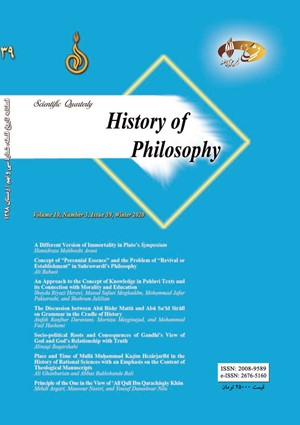Priority of Sophia to Phronesis and its Significance in Aristotle’s Philosophy of Ethics
Subject Areas : Philosophical thoughts in ancient IranAli Nazemi Ardakani 1 , Reza Davari Ardakani 2 , Malek Hosseini 3
1 - PhD candidate of Philosophy, Faculty of Divinity, Political Science, and Law, Islamic Azad University, Science and Research Branch, Tehran, Iran
2 - Professor of Philosophy, Faculty of Divinity, Political Science, and Law, Islamic Azad University, Science and Research Branch, Tehran, Iran
3 - Assistant Professor, Philosophy Department, Faculty of Divinity, Political Science, and Law, Islamic Azad University, Science and Research Branch, Tehran, Iran
Keywords: Aristotle Sophia Phronesis theoretical wisdom practical wisdom virtue eudaimonia,
Abstract :
The relationship between phronesis or practical wisdom and Sophia or theoretical wisdom and, at another level, the relationship between ethical virtues and intellectual virtues are among the important subjects in Aristotle’s philosophy of ethics. Their importance is due to the fact that not only in case of the priority of phronesis to sophia, contradiction will arise between Aristotle’s teachings in Metaphysics and Nichomachean Ethics, but also because it seems that such a priority will eventually lead to a kind of diversion from prime philosophy and, hence, considering human being as the noblest subject in philosophy. Of course, Aristotle himself disagrees with this position. This paper mainly inquires whether in Aristotle’s philosophy priority belongs to sophia or phronesis, and what the significance and consequences of the priority of one over the other is. The authors argue that, although phronesis has a supreme place in his philosophy, it is sophia which enjoys fundamental priority. On the other hand, in Aristotle’s system of thought, eudaimonia or the highest human good cannot be attained unless through possessing phronesis and Sophia at the same time. Hence, it seems that, in order to learn about the ultimate goal of philosophy, it is necessary to further deliberate over the concepts of sophia and phronesis and their relationships with each other and with other virtues.
ارسطو (۱۳۸۹الف) اخلاق نیکوماخوس، ترجمه محمدحسن لطفی، تهران: طرح نو.
ارسطو (۱۳۸۹ب) متافیزیک، ترجمه محمدحسن لطفی، تهران: طرح نو.
داوری اردکانی، رضا (۱۳۹۵) اخلاق در عصر مدرن، تهران: سخن.
روه (۱۳۹۴) «فرونسیس»، فرهنگ¬نامه تاریخی مفاهیم فلسفه، ج3، فلسفه اخلاق، تهران: مؤسسة پژوهشی حکمت و فلسفه ایران.
زگزبسکی، لیندا (۱۳۹۶) فضایل ذهن، ترجمه امیرحسین خداپرست، تهران: کرگدن.
شتمر، پ. (۱۳۹۴) «فضیلت»، فرهنگ¬نامه تاریخی مفاهیم فلسفه، ج3، فلسفه اخلاق، تهران: مؤسسة پژوهشی حکمت و فلسفه ایران.
گادامر، هانس گئورگ (۱۳۹۶) هرمنوتیک دین و اخلاق، ترجمه شهاب¬الدین امیرخانی، تهران: کتاب پارسه.
یگر، ورنر (۱۳۷۶) پایدیا، ترجمه محمدحسن لطفی، تهران: خوارزمی.
Gadamer, H. G. (2004). Truth and Method. London: Bloomsbury.
Noel, J. (1999). On the Varieties of Phronesis. Journal of Educational Philosophy and Theory, 31, 273-289.
Long, C.P. (2002). The Ontological Reappropriation of Phronesis. Journal of Continental Philosophy Review, 35, 35-60.
Long, C. P. (2004). The Ethics of Ontology: Rethinking an Aristotelian Legacy. New York: SUNY Press.


